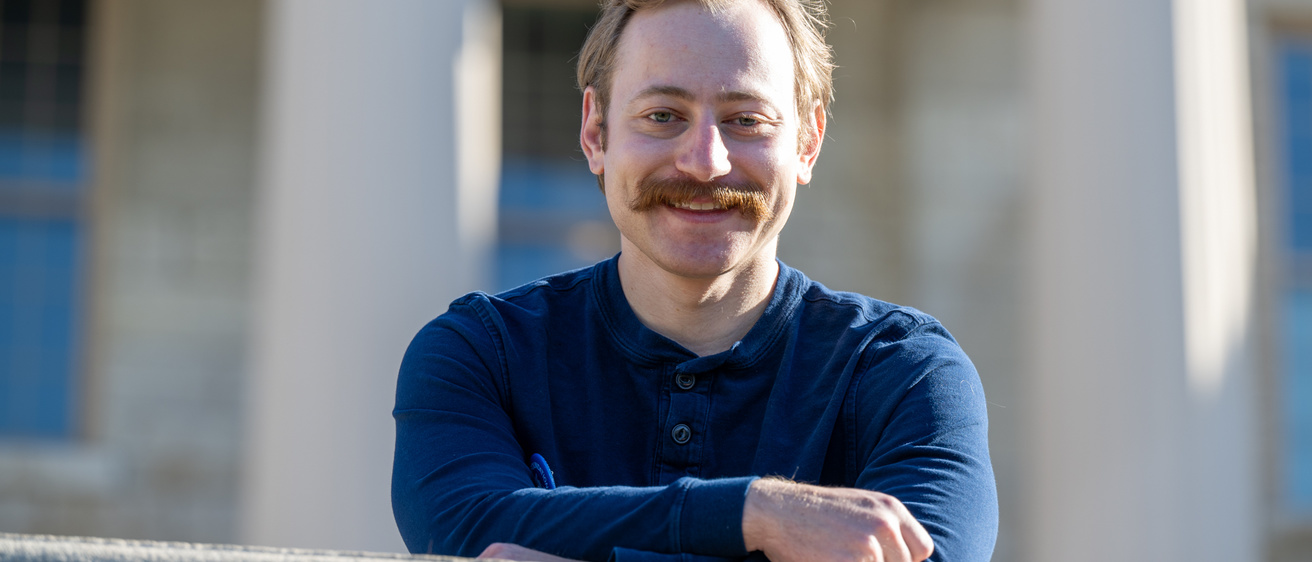University of Iowa PhD student David Ramotowski is working on how to decrease the effects of harmful chemicals found in soil deposits using Iowa’s most plentiful agricultural product: corn.
3MT competition winners
First Place Winner ($1,000): David Ramotowski, civil and environmental engineering, for his project, “Unlikely Heroes: Keeping Toxic PCBs Out of Our Air With Bacteria and Biochar.”
Honorable Mention ($500): Samuel Taylor, geography, for his project, “Better Protection Through Better Prediction: Climate-Resilient Debris-Flow Modeling.”
People’s Choice ($250): Maaz Musa, computer science, for his project, “Unveiling the Digital Veil: Empowering Transparency and Accountability in Online Privacy.”
Ramotowski, who is studying civil and environmental engineering, was named the winner of this year’s Three Minute Thesis (3MT) competition, which took place earlier this month. In the universitywide contest, graduate students share their research in three minutes or less to a general audience.
Ramotowski’s research focuses on how to clean up chemicals—specifically, polychlorinated biphenyls, or PCBs—in soil deposits and sediments by using bacteria, also known as bioremediation. Manufacturing of PCBs was banned in 1979 due to their harm to humans and the environment, but the chemicals have made their way into the soil and are slowly emitted into the air.
Ramotowski is part of the Iowa Superfund Research Program, where students work with local communities and governments to combat the negative effects of chemicals.
“There are five projects, and I work on the one where we are trying to prevent PCBs from going into the air,” Ramotowski says. “When people breathe them in, they can end up with cancer and other chronic health issues.”
Ramotowski’s preliminary research shows using bacteria in sediments contaminated with PCBs can break down PCBs and reduce their emissions by more than 50%. However, the difficulty lies in the liquid state of the bacteria, which can run off from the contaminated area before taking effect.
“Over the past 30 years, using bacteria has never really been done at the field scale,” he says. “It’s extremely challenging to do that.”
To combat the problem, Ramotowski has been working to grow the bacteria on biochar, a charcoal-like substance made with organic material, which would solve the issue of keeping the bacteria alive and able to break down PCBs. Ramotowski says biochar can be made with any organic substance, but research done by fellow PhD student Qin Dong shows that making the biochar out of corn works best with the bacteria.
In his final 3MT presentation, Ramotowski noted that using corn utilizes Iowa’s “fields of dreams” and “fields of opportunities” to combat the effects of toxic chemicals.
“Now, we will find out how the biochar works by running a preliminary experiment to see how much we need to add to the sediment for it to be effective against PCBs,” Ramotowski says. “Depending on those results, we will conduct a larger experiment to see how the bacteria performs over time. The ultimate goal is to grow this to a scale where it can be used in the environment.”
Using the biochar made from corn also would potentially be more cost effective and efficient than the most commonly accepted way to decrease PCBs in soil, which is by dredging the sediment and taking it to a chemical waste landfill, Ramotowski says. Another way people currently try to get rid of PCBs is by burning the sediment, which releases the chemicals into the air.
Ramotowski’s interest in environmental science, specifically breaking down pollutants in soil, sprang to life in high school and college. Originally from Alexandria, Virginia, Ramotowski earned a bachelor’s degree in environmental science from Virginia Tech and a master’s degree in soil science from North Carolina State University.
“When I was looking for a place to start my PhD, I was looking for programs similar to what I did previously, which had a more agricultural focus, and worked towards improving public health, which I am very passionate about,” he says. “I was looking for programs that offered research in my area of interest, and Iowa fit all of those categories.”
Ramotowski is the fourth-straight civil and environmental engineering student to win the 3MT competition. He says he was first introduced to the idea of the 3MT last year, when he had to make a three-minute research presentation as a class assignment for a coaching seminar. He also participated in the two 3MT competitions in the College of Engineering, placing second in that competition this year.
“It’s great that the department places such a heavy emphasis on communication,” Ramotowski says. “As an engineering student, it’s a good experience for me and helped improve my public speaking skills.”
